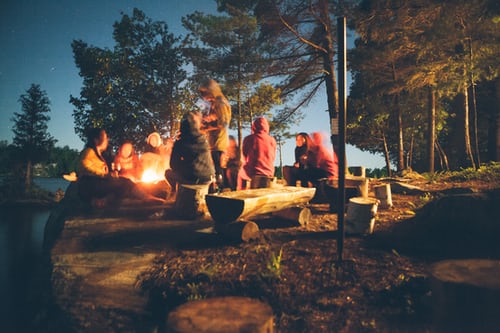Camping is a wonderful way to disconnect from the daily grind and connect with nature – there’s nothing quite like getting some much-needed R&R in the great outdoors. let’s take a look at the tips for a safe camping trip.
Camping is something everyone should do at least once in their life. But, before you throw your tent into the car and head out into the wilderness, you need to familiarize yourself with the correct protocols.
After all, campsites and national parks are wild places – it’s vital to take a few safety precautions.
Table of Contents
1. Wildlife Safety
While the wildlife you encounter can be enjoyed safely from a distance, national park rangers advise you to always respect a few rules when it comes to wild animals.
You should never feed any wildlife because it encourages animals to encroach onto campgrounds, which may pose a risk to humans.
Always keep your distance and never approach any animals – many of them are more dangerous than most people realize.
Keep all food in airtight containers in your car, and keep your campsite clean to avoid attracting bears. If your campsite or park is home to bears, carry bear spray on you at all times.
2. Fire Safety
Although camping just wouldn’t be the same without a campfire, you must follow strict fire safety protocols. The National Fire Protection Association recommends familiarizing yourself with fire safety measures to keep your fire under control.
Always have a means of extinguishing your fire before you start it. Keep a pile of dirt and a shovel or a bucket of water at hand.
Don’t start a fire on a dry, windy day, keep the fire at least 25 feet away from all structures and flammable materials, and keep the fire small and controlled.
Most importantly, never use gasoline or lighter fluid to start a fire, and supervise children and animals at all times.
Before you light a fire, make sure that you are allowed to have one – camping season is also high fire season, and some places will prohibit fires in forested areas and other places of high risk. Pay attention to notices in forested areas and at the entrance of the park.
3. Water Safety
If you are camping in a designated campsite, there will usually be a source of potable water. If you want to venture further afield, however, you’ll need to purify it before it’s safe to drink.
CDC guidelines recommend boiling the water, filtering it, using UV light, solar radiation, or chemical purification. You can also purchase water purification products in stores that sell camping supplies, so stock up before you go.
When you are camping, you are typically exposed to the sun more than usual. Remember to drink more water to stay hydrated – especially at higher elevations.
4. Prepare for the Weather
Always check the weather before you go camping so that you can prepare for the weather.
If you are camping in the mountains, expect cooler temperatures and prepare accordingly. To keep warm, place a layer between you and the ground, and use a hot water bottle in your tent at night.
Do not use portable heaters in your tent because you could get carbon monoxide poisoning.
If you are camping in warm weather, bring something to shade you from the sun and wear light clothing.
5. Bring the Right Equipment
The right camping equipment is essential for a safe and pleasant trip.
A basic checklist includes enough water, shelter and bedding, cleaning supplies, cooking supplies, and personal hygiene products.
Check all your equipment for defects and wear-and-tear, and make sure that none of your items have been recalled – you can look up items on Google to find this information.
6. Have an Emergency Plan
Campers and hikers get lost so often that search and rescue teams are kept busy all year round. If you do get lost, you can improve the odds of being found by telling someone where you are going.
Before you leave, give someone who will not be going with you an itinerary. Tell a family member or friend where you plan to start, what route you will take, and where you plan to go.
Be sure to include the contact details of everyone going with you, as well as the park or campground emergency contact numbers. You can also file a camping plan with the local sheriff’s department.
To minimize your chances of getting lost, always use a buddy system and stay on the trail. If you do get lost, remember that text messages are more likely to go through than a call when you are in a low-signal area. Getting to higher ground can boost your cellphone’s signal.
















